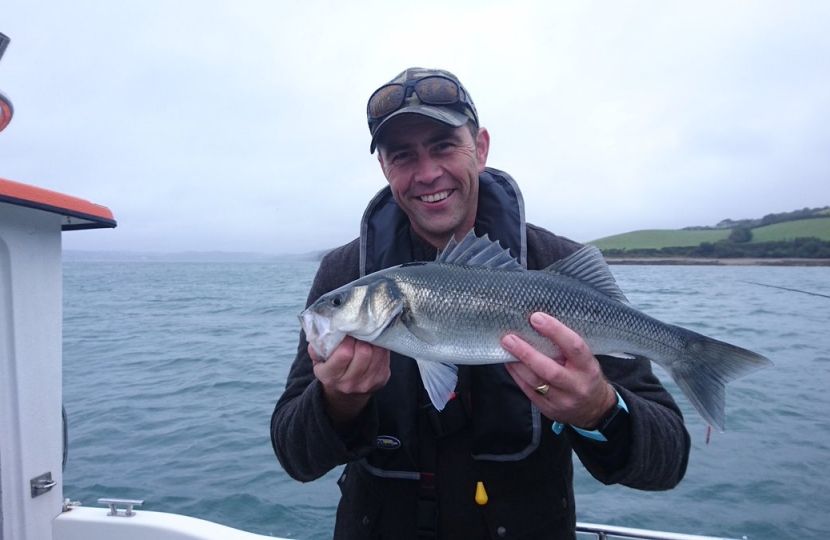
Scott Mann has urged government ministers to stand up for recreational anglers ahead of important fishing negotiations due to take place in Brussels next week.
The EU Fisheries Council, which takes place each December, involves EU member states negotiating fish quotas for the subsequent year. As part of the negotiations, there is a chance that the EU may impose further restrictions on anglers who catch sea bass.
Speaking in the Commons as the RSPB's Parliamentary Bass Champion, Scott Mann urged the Fisheries Minister to push back against "ridiculous and draconian proposals" which could see anglers banned from catching any sea bass for half the year. In response, the Minister said he would try to give recreational anglers more flexibility by arguing that commercial fisherman have firmer restrictions.
The current rules as set by the EU state that anglers are allowed to catch one bass per day between July and December, but that they must throw all fish back into the water between January and June. Now, though, the International Council for the Exploration of the Sea (ICES) has recommended a ban on targeting any bass for six months of the year, with a catch-and-release rule for the other six.
Evidence shows that bass stocks are in decline, but during the annual fisheries debate, a number of MPs argued that it is unfair to ban recreational anglers who have little impact on stocks.
Describing the negative impact that these rules could have on the angling sector, Scott Mann said:
"Although I recognise latest statistics on the continued decline in the biomass of the stock and further recognise that something needs to be done, it should not be done on the back of the rod-and-line angler.
"As a member of the all-party angling group and as a champion of the sea bass in Parliament, I recently had the pleasure of leading a delegation to Cornwall to fish for bass. We were hosted by a chap called Nick, who runs a successful family business called Bass Go Deeper. We had a successful trip, and all the fish were returned to the sea - catch and release. Nick, like many other bass guides in Cornwall and other hook-and-line beach and cliff anglers, will no longer be able to fish if the ridiculous and draconian proposals from ICES are implemented.
"If the proposals are truly meant for conservation, the angler is once again being penalised by comparison with the hook-and-line commercial fisheries that can effectively land four tonnes of catch each.
"Sport fishing in the UK is a lucrative and growing business. Businesses like Nick’s will go to the wall if these proposals are implemented. The recreational sea angling sector, which has had the least impact on fish mortality, will bear a disproportionate burden of last year’s negotiations, with a zero catch from January to June and a one-fish bag limit from July to September.
"That is why I support the campaign of the Angling Trust, the Save Our Sea Bass campaign and the European Anglers Alliance to stop these completely unfair and unenforceable proposals. Banning the public from fishing for a species recreationally while letting commercial hook-and-line fisheries continue is unjust and cannot be allowed.
"Catching a fish and keeping it for the pot is not a crime. Catching a fish and cooking it for dinner is one of the last great remaining hunter-gatherer pursuits in this country. The Minister should fight for anglers and oppose these ridiculous measures, which would sink a fine pursuit and a fledgling industry. There are thousands of anglers out there who are looking for his support this year."
Fellow Cornish MP Sheryll Murray, who led the debate, also described the ICES proposals as "unacceptable" and questioned how such a ban would be policed.
Addressing the concerns, Fisheries Minister George Eustice said that he would go to Brussels and make the argument that commercial fisherman should face further restrictions so that recreational anglers could have more flexibility.
He said:
"Three years ago, as Fisheries Minister I pushed for emergency measures for bass because the stock is in a precarious state. We secured that and I have tried since to ensure that the [EU] Commission gets the balance right between the actions it takes on recreational anglers and those they take on commercial fishing.
"We argued last year that there should be a lower catch limit for the hook-and-line commercial fishermen to create the headroom to give more leeway for recreational anglers. I will make a similar argument this year, but the scientific evidence has not been benchmarked to take account of the measures that have already been introduced, so the right thing to do might be to review the bass situation properly in March and we will point that out."
The debate also focussed on Brexit and the future of the UK fishing industry, with the Minister giving reassurances that once Britain leaves the EU, it will have complete control of its fishing waters.
Minister Eustice said:
"...It is our intention and plan to introduce a fisheries Bill in this Session. Early next year, we will publish more detailed proposals for that Bill, which we anticipate will be introduced during the course of the year, probably before the summer. The Bill will set out very clearly our approach, which is that when we leave the European Union we will become an independent coastal state under international law.
"We will take control of our exclusive economic zone, which is out to 200 miles or the median line. From that point, we will work with our neighbours to agree issues such as access and quota shares."
The full debate can be watched here, or click here to watch Scott's speech.
